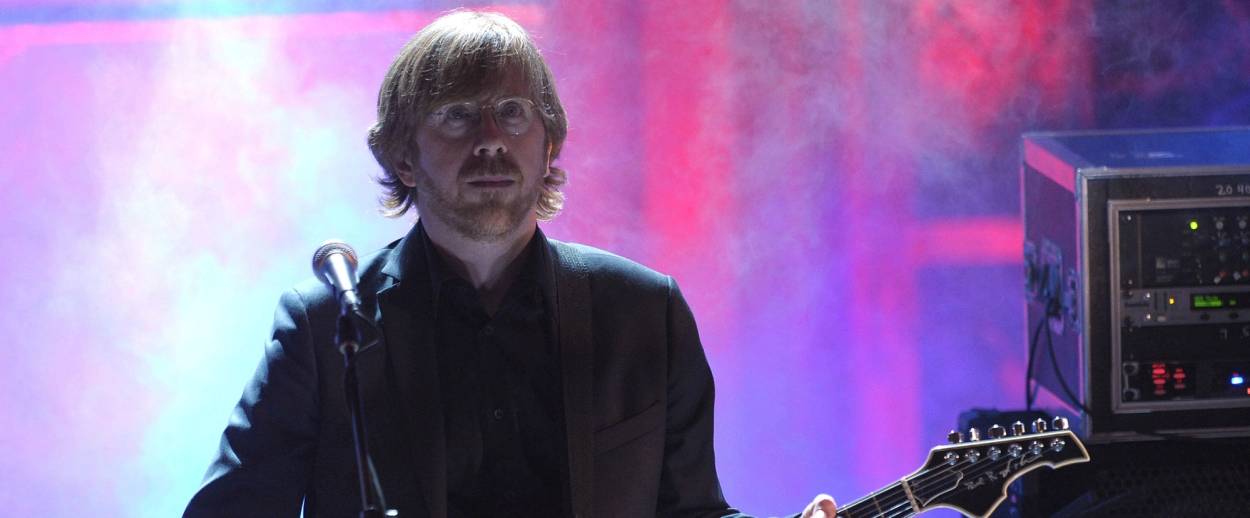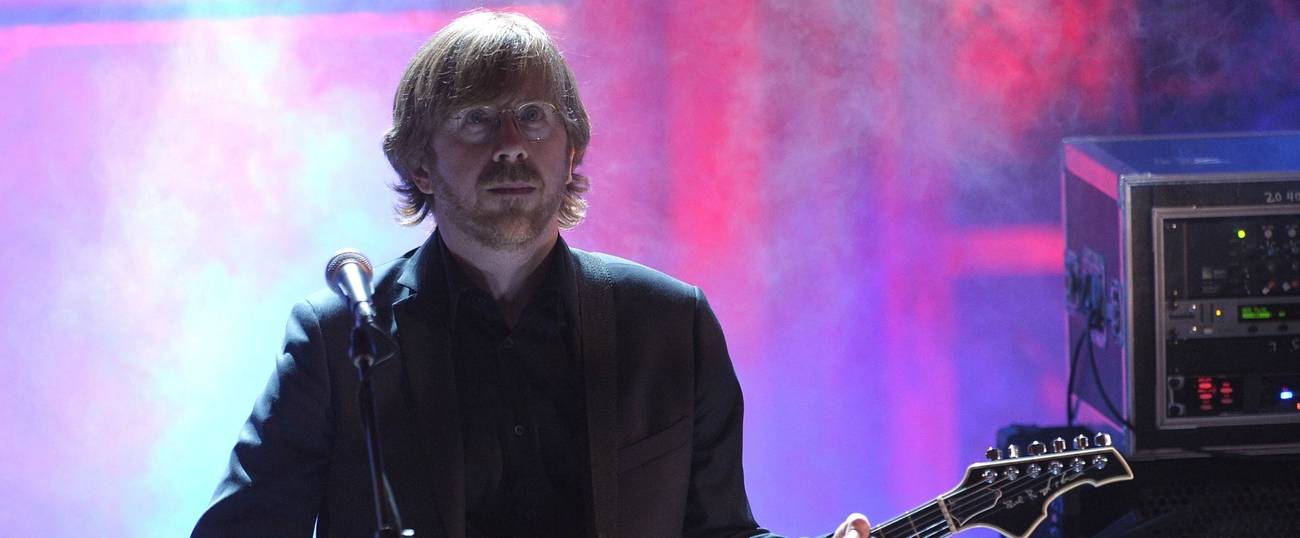Phish and Loathing in Bonnaroo
Jam bands, Post Malone, and other attempts at redemption at the nation’s most prominent music festival




“What band is this?” a much younger man in a baseball cap asked me on the Friday night of this year’s Bonnaroo in mid-June, at a point when it shouldn’t have been more obvious that the answer to this question was Phish. Roughly 24 hours later, I explained to a trio of 19-year-old Kentuckians that I wasn’t saying that I was a fish, but that Phish was in fact a multi-night headlining act at the very festival they had paid hundreds of dollars to attend.
Early on in the Torah, God asks, “where are you?” of a guilty Adam, another portentous episode in which an inexplicable gap in knowledge calls attention to deeper truths—although my youthful fellow festival-goers’ ignorance was less calculated than His. Not that He knows everything, though: Even with the benefit of something like total omnipotence it is doubtful God’s awareness was ever so perfect as to have glimpsed the future existence of Post Malone, never mind the reality of him performing in front of several tens of thousands of hyperventilating fans as one of the other headliners at America’s leading musical festival. The Kentuckians knew not Phish, but they didn’t need to. Their Phish was a slightly pudgy Texan rapper with face tattoos, and they were about to see him perform for the first time.
A thick screen of smoke billowed to the ceiling of the Tennessee festival’s hulking main stage, backlit in a mysterious soft red—it’s as if Post were bellowing set-opener “Too Young” from the lip of a volcano. He played a surprisingly touching acoustic version of “Stay” in which he showed off, I’m almost ashamed to admit, a vaguely Tom Yorke-like vocal range, and then grinded through “Psycho,” a mopey country-trap banger. “This is the only good song I ever wrote,” he quipped white introducing “White Iverson,” the gimmicky 2015 hit that launched a career marked by massive popularity and a dearth of critical acclaim. The source of Post’s appeal, as I understand it, is that there is Kohelet-level world-weariness contained in the swooping falsetto of the climactic lines, “White Iverson/When I started ballin’ I was young” to which the 20-year-old American ear is sharply attuned, despite or maybe because of the revulsion the song and Post’s runaway success and even his very being tends to induce in those with pretensions to decent taste.
Still, it felt somehow anti-music, or maybe anti-art, to actively hate what I was seeing. Post’s hooks were massive; his growls and vibratos stadium-sized or bigger. “Rockstar” was an awesome tower of despair; even the reprehensible “Candy Paint” approaches enjoyability when it’s blasted from a titanic sound system to 60,000 grateful fans who know every word. Clad in a short-sleeved dress shirt patterned with a picture of Dolly Parton’s face, Post was both one man alone on stage, cast against walls of light and actual fire, and also a puckish 23-year old bro speaking a language nearly everyone on hand could understand. How absurd it would be to try convincing the Kentucky teens, who had gotten stoned and laid and dumped to these songs, that they weren’t in fact experiencing a profound artistic connection, or that they were basic for finding any succor in Post’s music, or that they weren’t having fun, which is the main objective of any giant music festival.
Then came the voice of HaSatan, who started whispering to me about two-thirds of the way through: If art is judged solely on the basis of blunt emotion, then right and wrong and good and bad stop mattering. Something as dumb as a computer-animated horse playing a saxophone can make you happier than any Beatles album, and few charismatic lunatics ever succeeded without getting large numbers of people to think they felt their pain. Post was a buffoonish product of a bleak cultural moment, less worthy of a Bonnaroo headlining gig than a hundred other artists, including scores of non-white rappers whose sound and style he’d more gainfully embodied. To find something beautiful in this, HaSatan said, is to accept that everything is basically meaningless.
Lovers of art and music weigh a thousand internal debates like this one over the course of their lives, and they shake out less consistently than one might like to admit. An individual’s sense of what is and isn’t worthy is never fully formed, and the inner threshold for a healthy and rational cynicism can shift by the day or by the hour. Post has a way of clarifying the problem, though: He’s one of our era’s leading examples of schlock mutating into popular genius—not an uncommon transformation these days—and at Bonnaroo he pulled off the trick in about an hour flat. Of course I was singing along to “Congratulations” at the end of his set. Why even try to resist? Why not just enjoy it?
An answer, of sorts, came from the country artist Brandi Carlile, the incandescent vocal and songwriting talent who performed at the main stage on a sweltering Sunday afternoon. The distance between Post and Carlile, in terms of substance and depth, can be measured in parsecs–although in fairness, so can the distance between Carlile and nearly anyone else. The line between schlock and genius can clarify very quickly sometimes. Then later that night, Phish did what a fan of the Jewish sleepaway camp icons always hopes for but that they’d failed to do during that first performance two nights earlier: They found their zone and stayed there.
The fouresome’s improvisations were heavy and fast and weird for two and a half hours, and even a true phan had thrillingly little idea where it was all going—maybe the band didn’t even know where it was all going. Midway through the first set it stopped mattering what songs they were even playing. There were stretches of free jazz, shoegaze, and metal scattered throughout an exhilarating second set. Every number became an adventure to newer and stranger territory. Anything felt possible; even an often-predictable set-piece like “Fuego” exploded into something I’d never heard before. As if to slyly acknowledge what they’d just pulled off, Phish closed their encore, and thus the 19th edition of Bonnaroo, with the instrumental “First Tube,” which is somewhere around their 31st most beloved song, sometimes an early-set warm-up and not everyone’s idea of an exclamation point. When Trey Anastasio raised his guitar over his head and ended the festival on thunderous jet engines of guitar feedback, I doubt anyone felt short-changed.
This is why you sleep in a hot field and pay $26 for packs of cigarettes, I thought when wandering through the dusty silence that follows the end of a four-day music festival: To view everything else in life from heights you’d never otherwise reach, and to spend a few brief moments in places only live music could take you. Did it really matter if Post Malone or Brandy Carlile or Phish led the way there? Ask me in five years or an hour—the answer’s likely to change.
Armin Rosen is a staff writer for Tablet Magazine.